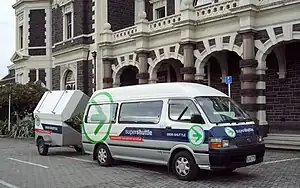Public transport in the Otago Region
The public transport system of Otago is primarily based around the major cities of Dunedin and Queenstown. It includes the separate Orbus branded networks of Dunedin, and of Queenstown.
 | |
| Parent | Otago Regional Council |
|---|---|
| Founded | 1986 |
| Locale | New Zealand |
| Service area | Dunedin, Queenstown |
| Service type | Bus |
| Routes | 16 in Dunedin, three in Queenstown |
| Hubs | Dunedin Bus Hub, Great King St; Frankton bus hub, Queenstown |
| Daily ridership | 2.2 million passengers per year[1] |
| Fuel type | Diesel |
| Operator | Go Bus Transport, Ritchies Transport |
| Website | Dunedin Buses |
Buses in Dunedin, New Zealand are the primary form of public transport. The Otago Regional Council designs routes and schedules and contracts operation of bus services to two bus companies, Go Bus Transport and Ritchies Transport. Services operate daily at mainly 15 to 30-minute headways; services on evenings, weekends and holidays at about half the weekday frequency and there are no services on late Sunday or holiday evenings, nor on Christmas Day, Good Friday or Easter Sunday.[note 1]
Bus fares are paid for by cash or by the electronic ticketing system Bee Card. The Bee Card replaced GoCards on 1 September 2020.[2] Prior to GoCards, multi-trip paper tickets were used until November 2007.
The Dunedin bus service carries 2.2 million passengers per year.[3]
Dunedin bus routes
Most routes are cross-city routes via the Dunedin city centre. Longer-distance routes terminate in the centre. Semi-orbital route 15 Ridge Runner links most inner suburbs but avoids the centre. The Mosgiel 77 semi-express service has a branch route 70 connecting at Green Island and a figure-8-shaped 80/81 Mosgiel Loop connecting on Mosgiel's main street, Gordon Rd. Transferring between routes, historically not a feature of Dunedin bus services, is more favourable under the current fare regime.
| Route number (or destination number)[note 2] | Outer terminus | via | City bus hub stops (northbound/southbound) | via | Outer terminus | Bus operator | |
|---|---|---|---|---|---|---|---|
| 1 | Palmerston | Waikouaiti, Karitane, Waitati, Dunedin-Waitati Highway | J | – | – | Ritchies | |
| 3 | Ross Creek | Glenleith, George Street | C/H | South Dunedin, Tainui | Ocean Grove | Go Bus | |
| 5/6 | Pine Hill | Gardens, George Street | E/J | Caversham | Lookout Point | Ritchies | |
| 8 | Normanby | Gardens, George Street | D/I | Cargill's Corner, South Dunedin | St Clair | Go Bus | |
| 10/11 | Opoho | Gardens, George Street | E/J | South Dunedin, Musselburgh | Shiel Hill | Ritchies | |
| 14 | Port Chalmers (Harrington Street) | Careys Bay, Port Chalmers, Sawyers Bay, Roseneath, St Leonards, Burkes, Ravensbourne, Logan Park, University | B | – | - | Ritchies | |
| 15 "Ridge Rider" (semi-orbital route) | University (Forth St) | Gardens, North Dunedin, Maori Hill, Roslyn, Mornington, | – | – | South Dunedin (Andersons Bay Rd) | Ritchies | |
| 18 | Portobello | Edwards Bay, Turnbulls Bay, Broad Bay, Company Bay, Macandrew Bay, The Cove, Exchange | G | – | – | Ritchies | |
| 19 | Waverley | Musselburgh, South Dunedin, Exchange | A/I | City Rise | Belleknowes | Go Bus | |
| 33 | Corstorphine | Caversham, Cargill's Corner | C/H | City Rise, Roslyn, Kaikorai | Wakari | Go Bus | |
| 37/38 | Concord (38) | Kenmure, Bradford, Kaikorai, Moana Pool | G/A | Otago Museum | University (Forth St) (37) | Ritchies | |
| 44 | St Kilda | Cargill's Corner, Exchange | D/I | Kaikorai | Halfway Bush, New Zealand | Go Bus | |
| 50 | Helensburgh | Balmacewen, Maori Hill, City Rise | C/H | Cargill's Corner, Kew, St Clair Park | Corstorphine | Go Bus | |
| 55 | St Kilda | Cargill's Corner, Exchange | D/I | Kaikorai | Brockville | Go Bus | |
| 61 | Kenmure | Mornington, Exchange | C | – | – | Go Bus | |
| 63 | Balaclava | Mornington, Exchange | A/F | Otago Museum, University | Logan Park | Ritchies | |
| 70 | Brighton | Ocean View, Waldronville, Abbotsford | – | – | Green Island (transfer to/from route '77) | Go Bus | |
| 77 (semi-express) | Mosgiel Centre Street | Gordon Rd, Fairfield, Sunnyvale, Green Island (transfer to/from route 70), Dunedin Southern Motorway, Exchange | F | – | – | Go Bus | |
| 80 | – | Mosgiel Loop east circuit | – | – | – | Go Bus | |
| 81 | – | Mosgiel Loop west circuit | – | – | – | Go Bus |
 All routes use wheelchair-accessible buses
All routes use wheelchair-accessible buses All routes use buses fitted with bike racks
All routes use buses fitted with bike racks
Organising bus routes in Dunedin
Dunedin's bus network is designed and managed by the Otago Regional Council. Fares are levied to cover about half of operating cost with the balance subsidised by Otago Regional Council ratepayers (about a quarter) and New Zealand Transport Agency (the remaining quarter; funded by fuel tax and road user charges). Buses use the individual companies' livery with Otago Regional Council stickers added. Until 2015, all services operated under the brand Gobus; this ended when a bus company with a similar name began serving the city. The regional council intends to introduce a new brand Orbus to the network[4] Safety standards are regulated by the NZ Transport Agency (NZTA). The Dunedin City Council has no administrative role other than as provider of the road infrastructure (with the exception of State Highways, for which NZTA is the provider), street furniture such as signs and seats and regulation of parking at bus stops. However, the city council is involved in discussions with the regional council over taking over the management of public transport.[5]
History of public transport in Dunedin
The Dunedin City Council operated and managed most public transport until 1986 including the Dunedin cable tramway system (similar to the famous San Francisco cable cars) between 1881 and 1957, electric trams from 1900 to 1956, trolleybuses from 1950 to 1982 and motor buses from 22 April 1925[6] to 1986. From 1986, management of bus services became the responsibility of the Otago Regional Council; the city council continued as a contracted operator of many services through its subsidiary Citibus.
New Zealand Railways (NZR) operated commuter trains from the Dunedin railway station to Port Chalmers and to Wingatui and Mosgiel until 1979 and 1982, respectively. Reintroduction of rail services is suggested from time to time[7] NZR, through its Road Services division, from 1985 known as Cityline, also operated motor buses to the suburbs of Warrington, Cherry Farm, Brighton, Outram and Mosgiel until Cityline was privatised in 1991 – the Dunedin fleet was sold to Newtons Coachways. All the above-mentioned train or bus routes except Warrington and Outram continue to be served by the present bus system.
In early times, there were ferries connecting the central city to Port Chalmers and Portobello, but these ceased between the 1930s and 2018 as road connections along the harbour's edge were improved.
Former privately owned public transport operators in Dunedin included Turnbulls (Dunedin to Portobello); Newtons (Dunedin to Waverley), Otago Road Services (Dunedin to Green Island, Abbotsford and Fairfield), all of whom operated services over several decades from the 1950s to the 1980s and 1990s. From the late 1980s onwards, Cesta Travel (later called Southeastern) and Dunedin Passenger Transport operated a wide range of routes on various short-term contracts.
In late January 2020, the Dunedin City Council voted to reduce bus fares while exploring the re-establishment of a commuter rail link between Mosgiel and the Dunedin city centre. This includes allocating $600,000 to bus subsidies.[8]
Airport buses

There are no conventional airport bus services to Dunedin Airport: this airport is served by a large fleet of shuttle vans provided by several operators including most of the local taxi companies. Airport shuttle vans typically stop several times en route to pick up or let off booked passengers.
Orbus runs bus route 1 to Queenstown Airport from other parts of Queenstown.[9]
Notes
- A local bus museum society operates on two routes on the three non-service days of Christmas Day, Good Friday and Easter Sunday
- Destination numbers are being phased out
References
- 12 months to July 2016, quoted in Bus patronage better Archived 3 December 2017 at the Wayback Machine on Otago Daily Times website, viewed 2 December 2017
- "The Bee Card Launches In Dunedin Next Week | Scoop News". www.scoop.co.nz. 28 August 2020. Archived from the original on 21 May 2023. Retrieved 27 May 2023.
- 12 months to July 2016, quoted in Bus patronage better Archived 3 December 2017 at the Wayback Machine on Otago Daily Times website, viewed 2 December 2017
- New Queenstown bus service identity unveiled Archived 3 December 2017 at the Wayback Machine on Scoop.co.nz website, viewed 2 December 2017
- Morris, Chris (20 August 2011). "Councils in talks on buses". Otago Daily Times. Archived from the original on 14 January 2012. Retrieved 30 August 2011.
- 'New Motor Buses' article in Otago Daily Times, 18 April 1925
- for example "Down at the Station". New Zealand Railway Observer. Wellington: New Zealand Railway and Locomotive Society. 65 (4): 153. October 2008. ISSN 0028-8624.
- Perry, Emma (30 January 2020). "DCC votes to reduce bus fares". Otago Daily Times. Archived from the original on 30 January 2020. Retrieved 30 January 2020.
- "Queenstown Bus Timetable Route 1" (PDF). Otago Regional Council. November 2019. Retrieved 14 June 2023.